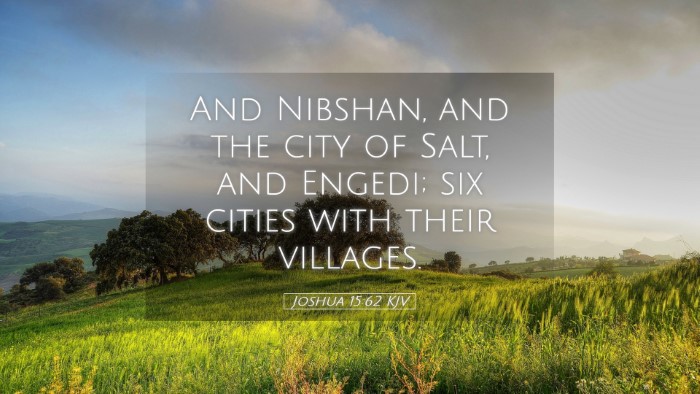Commentary on Joshua 15:62
Joshua 15:62 states, “And Nibshan, and the city of Salt, and Engedi; six cities with their villages.” This verse concludes the enumeration of cities within the territory allotted to the tribe of Judah. These cities symbolize not only geographical locations but also spiritual reflections on the heritage and the promissory aspects of God's covenant with Israel.
Historical Context
The book of Joshua marks the transition of the Israelites from wanderers in the wilderness to establishers of a nation in Canaan. The allocation of land was a pivotal moment for Israelite identity. As Judah receives its portion, each city mentioned represents not just real estate, but also narratives of struggle, faithfulness, and divine promise.
Geographical Significance
-
Nibshan: Considered to be a small city, Nibshan emphasizes the gradual inhabitation and reclamation of the Promised Land by the Israelites. It serves as a reminder of God’s provision and presence in what may seem like insignificant locations.
-
The City of Salt: The city referred to as the City of Salt is indicative of the mineral resources found in the area, particularly resembling the salt plains near the Dead Sea. Its mention can be a metaphor for the distinctiveness of God's people, much like salt preserves and adds flavor to food (Matthew 5:13).
-
Engedi: Engedi, famed for its lushness and as a refuge near the Dead Sea, symbolizes safety and sustenance amidst arid surroundings. It illustrates God's ability to provide shelter and abundance within desolation, reflecting the broader narrative of divine care throughout Israel's journey.
Theological Implications
Each city belongs to the fulfillment of promises made to the patriarchs. The allocation of these cities thus enacts God's faithfulness to His people. It is crucial for pastors and theologians to reflect on the broader implication that God fulfills His covenant promises, no matter how distant they may seem from the present circumstances of His people.
Faithfulness of God
Commentators highlight the significance of God's unwavering commitment. Matthew Henry notes that despite the Israelites' shortcomings, God remains faithful in granting them their inheritance. The mention of specific cities reinforces the idea that every promise will find its historical and spiritual fulfillment.
Reflections on Community
The enumeration of villages along with city names in this verse emphasizes the communal life that is intended among God’s people. In studying these names, we uncover a deeper understanding of how God envisioned Israel as a collective entity reflecting His glory. As churches and theological communities read this passage, they are encouraged to consider their own communal identity and mission.
Lessons for Modern Believers
For contemporary readers, this passage invites numerous reflections on identity, community, and divine faithfulness. Adam Clarke points out that the acknowledgment of even minor towns encapsulates a sense of belonging within God’s greater design. It encourages believers to recognize their place in God's kingdom, regardless of their perceived importance.
Identity in Christ
Just as the Israelites received their portion in the land, believers today are reminded of their inheritance in Christ. The Apostle Paul emphasizes this in Ephesians 1:11, where believers are assured that they are predestined to be part of God's family through Christ. Understanding this inheritance fosters a sense of purpose and belonging within the body of Christ.
Communal Responsibility
The mention of cities and their villages serves as a profound reminder that we are called to live out our faith in community. The idea of responsibility toward one another and support reflects the communal aspects of early church life depicted in Acts 2:44-45, which speaks to sharing and serving within the local faith community.
Conclusion
Joshua 15:62, though briefly stated, provides rich commentary on God's faithfulness, the importance of community, and the realization of promises. As pastors, students, theologians, and Bible scholars delve into this verse, it serves as a cornerstone for understanding how the lineage of Judah, the cities they occupied, and their struggles and triumphs echo God's overarching narrative of redemption. In the modern context, it inspires believers to embrace their identity, understand their communal role, and cherish the promises of God, knowing that they are part of a grand, divine inheritance.


